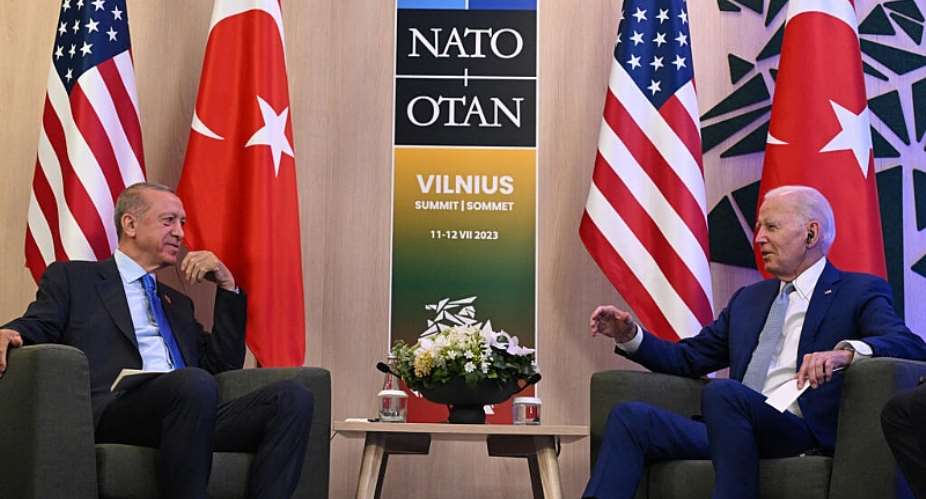Ankara's ratification of Sweden's NATO membership after a 10-month delay has spurred hopes of a reset in relations between Turkey and the alliance, but tensions still run deep.
French President Emmanuel Macron's recent state visit to Sweden focused heavily on defence amid Russia's ongoing war in Ukraine.
While its NATO membership was seen as critical amid persisting concerns over border security, Turkey refused to ratify Sweden's entry until a long list of demands from its partners were met.
Sweden's accession saw a lifting of restrictions by NATO countries on military hardware sales to Turkey, says Aydin Selcen, a former senior Turkish diplomat who is now a regional analyst for Mediyacope, a Turkish news portal.
"F-16s are being bought [from the US]. This will keep the Turkish air force up in the air for some time... Deals like this one will keep the relationship afloat," he told RFI.
F-16 deal
For years, US President Joe Biden blocked the sale of American F-16 fighter jets amid concerns over rising tensions between Turkey and its neighbours over territorial disputes.
With Ankara ratifying NATO's expansion, the White House has authorised the sale, and Congress is expected to ratify the deal. However it may not be the diplomatic victory Ankara claims.
"The last I heard was the State Department was drawing up a letter demanding the transfer of F-16s as a kind of a certification program," says Turkey specialist Sinan Ciddi, of the Washington-based Foundation for Defense of Democracies.
"They could halt transfers if the Turks , for example, continue to antagonise Greek airspace or overflights."
Erdogan's advantage?
Erdogan may retain an advantage, though. Hungary has yet to ratify Sweden's membership and Hungarian Prime Minister Victor Oban is a close ally of the Turkish leader.
Last week, acting US Deputy Secretary of State Victoria Nuland held two days of talks in Ankara. The talks were focused on enabling better cooperation between the US and Turkey.
Analyst Selcen says Turkey's is still as strategically important to NATO as it was when it joined in 1952 at the height of the Cold War.
"The same geopolitical reasons to keep Turkey as a strong military ally remain valid," said Selcen. "On the one hand against the north, Russia, and on the other Iran and other terrorist threats."
The war against the Islamic State jihadists remains a point of tension because of Washington's support for Syrian Kurdish fighters.
These include the YPG, which is affiliated with the PKK, and which has been fighting Turkey for decades and is designated by both the European Union and the US as a terrorist group.
"The US relationship with YPG poisons almost all the potential collaborations," political scientist Bilgehan Alagoz of Istanbul's Marmara University says.
So first [the] United States should check its policy towards the YPG, and then Turkey and the United States can start talking about other issues."
Erdogan, Alagoz adds, is holding NATO hostage to extract concessions over Sweden's membership.
Along with his close relationship with Russian President Vladimir Putin and his refusal to impose sanctions against Moscow, this is raising questions over Ankara's loyalties.
With the threat posed by Russia expected to grow, and the danger of contagion from the Israel-Hamas conflict, resolving the trust deficit between Turkey and its NATO partners has never been more important.





 Let’s be true believers, not just church goers – Catholic Priest to Christians
Let’s be true believers, not just church goers – Catholic Priest to Christians
 Ejisu by-election: "We don’t need an independent candidate" — Akufo-Addo fights ...
Ejisu by-election: "We don’t need an independent candidate" — Akufo-Addo fights ...
 Election 2024: Bawumia dares Mahama to two-man debate as he starts countrywide t...
Election 2024: Bawumia dares Mahama to two-man debate as he starts countrywide t...
 'Borla' BVDs: 'Why would anyone want to buy 10 used biometric devices 'hard-code...
'Borla' BVDs: 'Why would anyone want to buy 10 used biometric devices 'hard-code...
 Professor Jane Naana pays last respect to Modestus Ahiable
Professor Jane Naana pays last respect to Modestus Ahiable
 IT is a major skill needed for the job market - Industry Players
IT is a major skill needed for the job market - Industry Players
 Nungua Traditional Council performs “Jenten Nishwamo” ahead of Homowo
Nungua Traditional Council performs “Jenten Nishwamo” ahead of Homowo
 Tema residents demand end of dumsor
Tema residents demand end of dumsor
 A vote for Owusu Aduomi is a vote gor NDC – Bawumia tells Ejisu residents
A vote for Owusu Aduomi is a vote gor NDC – Bawumia tells Ejisu residents
 S. Africa's ex-president Zuma makes surprise comeback
S. Africa's ex-president Zuma makes surprise comeback
